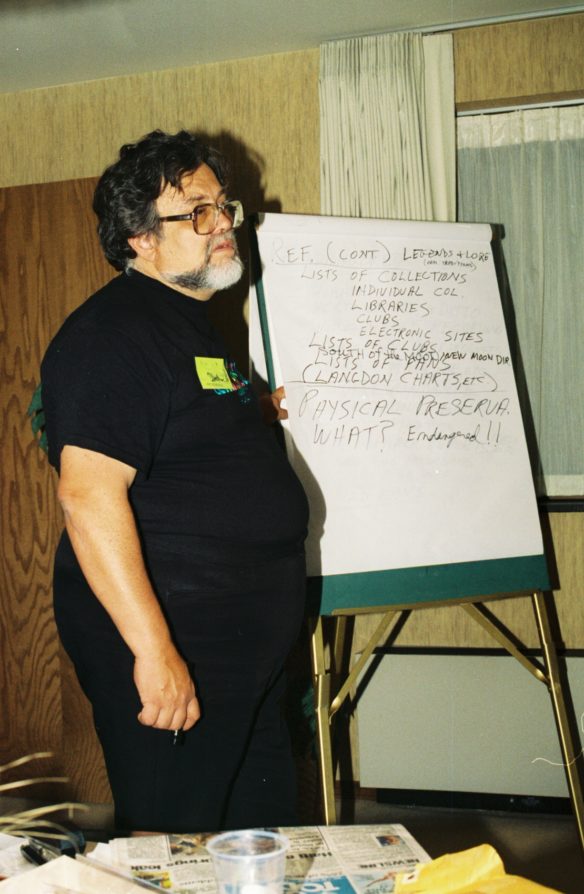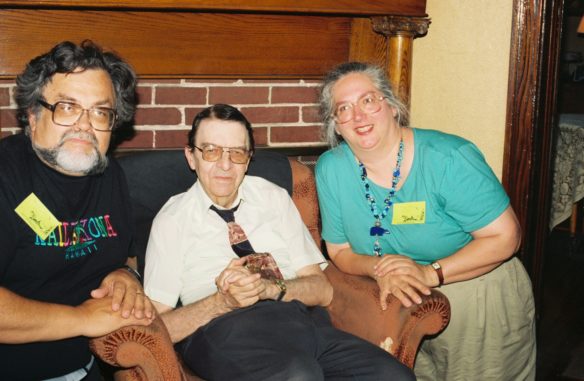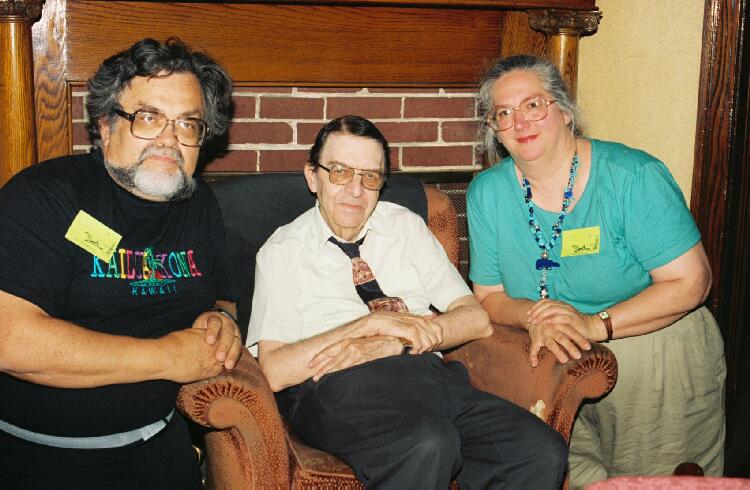
By Rich Lynch: Twenty years ago today I lost a friend. I remember first learning about it from an Internet news group: [Matthew Tepper] “I have just returned from tonight’s LASFS meeting. Larry Niven announced that Bruce Pelz died this afternoon.”
I’m trying to think back to when I first met Bruce. I can’t pinpoint it exactly, as I’d known of him practically since my entry into fandom in the mid-1970s – he was frequently mentioned in many fanzines that I read back then. But I’m sure that our first face-to-face meeting was in 1979, when my job in industry took me from Chattanooga all the way out to Los Angeles for some much-needed training in electrochemistry. I didn’t really know anybody in L.A. fandom back then but I did know the address of the LASFS clubhouse, so on my next-to-last evening in town I dropped in on a meeting. And it was there that I found Bruce mostly surrounded by other fans while they all expounded on fandom as it existed back then and what it might be like a few years down the road. It was like a jazz jam session, but all words and no music. I settled back into the periphery, enjoying all the back-and-forth, and when there eventually came a lull in the conversations I took the opportunity to introduce myself. And then Bruce said something to me that I found very surprising: “Dick Lynch! I’ve heard of you!”
Thus began a friendship that lasted right up to his death in 2002. It took a few years after that first meeting for me to develop a strong interest in fan history, and Bruce was partly responsible for that. My wife Nicki and I decided to publish Mimosa, a fanzine dedicated to fan history, in large part because of Bruce and other fans interested in preservation of our past enthralled us with entertaining and interesting stories about fandom’s past eras. It was inevitable that Bruce and I would work together on fan history projects, but it took more than a decade after our initial meeting before the first of those happened – he used his considerable power of persuasion to convince me to be editor of Harry Warner, Jr.’s anecdotal history of fandom in the 1950s, A Wealth of Fable. It had previously existed as a three-volume fanzine, filled with a myriad of typographical errors that needed to be fixed and more than a few instances of incorrect or outdated information that needed to be re-researched. This was officially a project of a L.A.’s Worldcon corporation, SCIFI, but in actuality it was Bruce who was the project manager. And also my chief researcher. I leaned on him, heavily at times, to take advantage of his deep knowledge of fandom of that era and also his extensive library of fanzines that often contained exactly the information we were looking for. How he knew where to find it I’ll never know, but he always did.
After that came a much less successful undertaking, the now-moribund 1960s fan history project. Bruce was once again an able researcher, and his involvement was a big reason we were able to produce a knowledge base of sorts that now resides on the Internet in the form of a very extensive outline. The project eventually proved to be undoable, mostly because 1960s fandom was so much larger in size and scope than its 1950s predecessor that it became obvious that a lot more research was needed than either of us had time or resources for. But for a few years we both had a lot of fun, if that’s the right word, discovering and sometimes re-discovering various nuggets of information about that era which eventually made their way into the outline.
It might be that the 1960s project was a progenitor of FanHistoricon. Bruce, along with Joe Siclari and Peggy Rae Pavlat, came up with the idea and the first one was held in 1994, deliberately sited in Hagerstown, Maryland so that attendees could have the opportunity to visit the legendary Harry Warner, Jr. at his home there. That’s probably the main memory which most attendees took away with them, but Bruce also used the occasion to do some ideating in the workshop portion of the event. The result was formation of the Timebinders, an informal association of fans which had the goals of ensuring the preservation of endangered fannish materials and finding ways of making fan historical information more widely available. That organization, in the end, was a bit too informal to last for very long, but it was most likely an inspiration for a parallel organization which has all the same goals: fanac.org. Joe Siclari was one of the main architects of that but it’s I think it’s fair to say that Bruce, holding forth as he did at the first FanHistoricon, certainly helped to plant some of the seeds.

These are not nearly all the projects and activities that Bruce originated or was otherwise involved in over the more than four decades of his life in fandom. He was the driving force behind the creation of Retrospective Hugo Awards. He championed a large fundraising campaign which allowed LASFS to purchase its first clubhouse. He persuaded LASFS to hold an annual convention, Loscon. He edited and published the focal point newszine Ratatosk in the middle part of the 1960s. He was active in many amateur press associations and founded the annual Worldcon Order of Faneditors (WOOF). He was the much-deserving Fan Guest of Honor at the 1980 Worldcon. And outside of the science fiction genre, he was one of the creators of the World Mystery Convention, BoucherCon.
Bruce was also an avid fanzine collector, as I’ve described earlier, and at one point had arguably the largest collection in the world. I feel fortunate that I got to see it, back in the mid-1990s, and it was amusing to learn about his modus operandi for sorting new acquisitions: toss them gently into the air and after they come to rest on the floor, peruse through them for interesting stuff before filing them one by one. That’s just one of many pleasant memories I have of Bruce. Living on opposite coasts of the United States, we didn’t physically cross paths all that often and I treasured the times that we did. The final one was at the 2001 Worldcon in Philadelphia, though I’m not sure when during the convention it was. It probably happened when we went to dinner on Saturday night, prior to the masquerade. I remember that we shared about an hour’s worth of conversation, on topics ranging from places in the world we wanted to go back to (he was a world traveler in his final years) to what we thought would make good fan history projects in the future. Before we parted he told me a story about him spending a night in Robert Heinlein’s fallout shelter that he soon afterwards wrote up for Mimosa. No surprise, he was also a really good writer.
Back then, I don’t think I ever once thought that would be the last time I’d see him. He was always a rock, someone whose presence at Worldcons I attended seemed an absolute certainty. And then, less than a year later, he was gone. Two decades after Bruce’s passing, rarely does a week goes that I don’t think of him. He was a great friend. And also a strong influence. Whenever I’m at a loss on how to proceed on some kind of fandom-related project I’m involved with, I often ask myself, “What would Bruce do?” It usually helps a lot.

